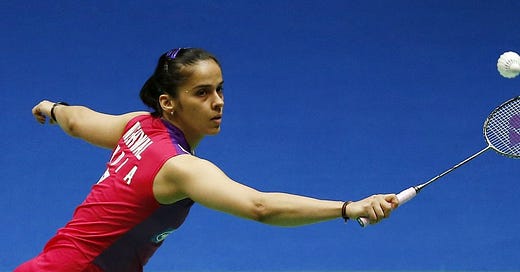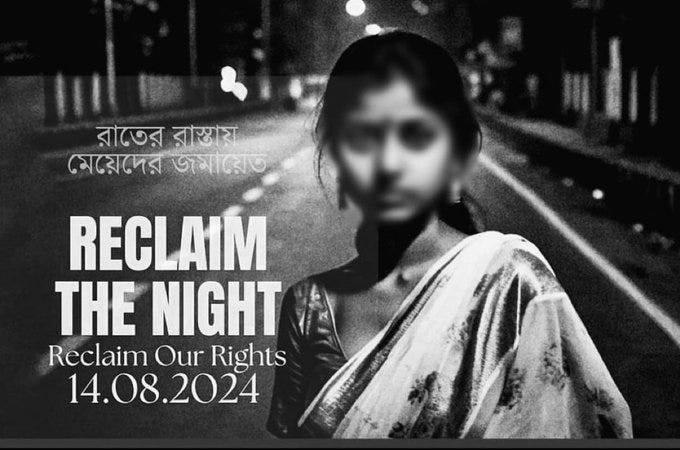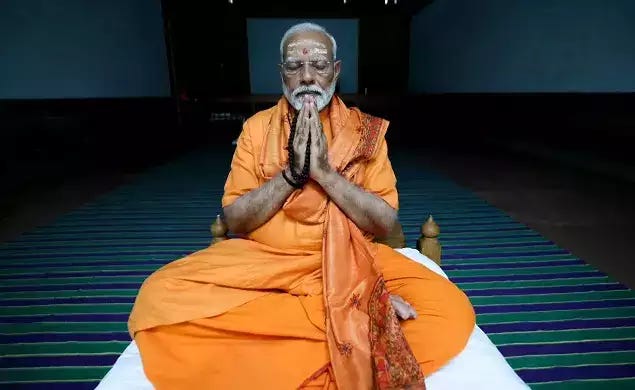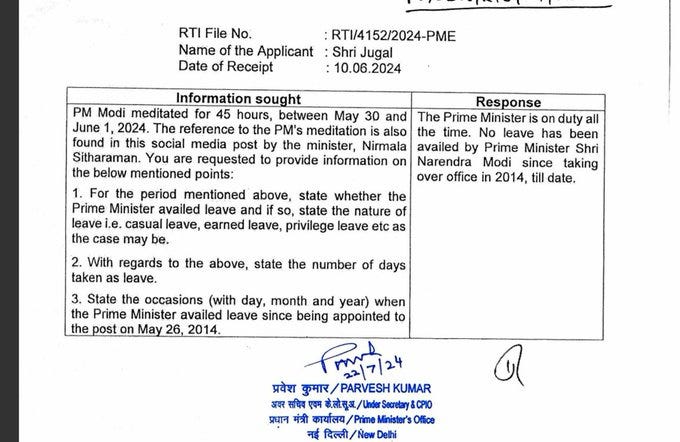“Sport doesn’t build character — it reveals it”
I’ll start with some excerpts from a book I’d read earlier, and which I dug up, dusted off, and went through last night.
On Coaches:
“My first coach was PSS Nani Prasad,” Saina Nehwal wrote in her autobiography Playing to Win. She goes on to mention SL Goverdhan and S Mohammed Arif, a Dronacharya awardee, among her early mentors. “Coaches are more than just trainers for players,” she writes. “They are almost family, and they see us through all our highs and lows.”
She details how, when she was 12, her mom had a serious head injury late one night, and her first instinct was to call then coach Goverdhan, who immediately rushed to hospital and was with the family throughout.
Later in her narrative, she recounts how Pullela Gopichand was “a huge help” to her during the junior nationals in 2002 (Saina was then 12 years old). “In 2003, the Sports Authority of Andhra Pradesh offered Gopi sir space at the Gachibowli Stadium to run the academy. All of us who were training at the Lal Bahadur Stadium shifted to Gachibowli, where ten wonderful courts were available to us.” (Emphasis mine).
On Awards:
“The Arjuna award came first in 2009… (Saina was 19 then). It was made more special because that same year my present coach, Pullela Gopichand, was honoured with the Dronacharya award given to sports coaches…
“A few months later, in January 2010, Papa received a call. It is one of those calls that come once a lifetime, if you ask me. The caller was an official from the Ministry of Home Affairs. He said, ‘Your daughter is to be awarded the Padma Shri. Does she accept?’
Crowning Glory:
“But the award that is closest to my heart is the Rajiv Gandhi Khel Ratna Award. Only one among all sportspersons is chosen for this honour and for me, 2010’s golden moment was this. I felt I had truly deserved it. Even more touching was when both houses of the Indian Parliament gave me a standing ovation in December 2011, and more recently in March 2012.”
Since her pre-teens, Nehwal has by her own account had the benefit of good, empathetic coaches and the best of facilities.
The government that conferred the Arjuna award on her was led by Dr Manmohan Singh; so too the government that awarded her the Padma Shri and the Khel Ratna.
Dr Singh and then Minister for Home Affairs Mr P Chidambaram were among those who stood to give her a standing ovation. (The Modi government had a contribution, too: In 2021, it renamed the Rajiv Gandhi Khel Ratna Award as the Dhyan Chand Khel Ratna Award.)
This is the Saina Nehwal that, today, gives an interview where she, among other things, says Vinesh Phogat should take some of the blame for the events in Paris that led to her disqualification, disses those commenting about the incident as people who don’t know the ABCD of sport, and further says that since Modi came to power, players get the best of facilities, top quality coaching and associated support staff — none of which was true in her time.
A clip of the interview was picked up by the government-adjacent Twitter handle @MyGovIndia and further propagated with the barf-worthy addition: “Her words echo the sentiments of countless athletes who have found their wings under the nurturing embrace of PM Narendra Modi…”
It is worth pointing out that in this nurturing embrace, Saina’s last appearance on court was in June 2023 when she lost in the first round of the Singapore Open, an event she first won at the age of 19. She is currently ranked #97 in the world, and is not in the top 100 when it comes to Olympics rankings.
None of this is to diss the achievements of a sportsperson who has won numerous laurels and who has, by her presence, helped influence the next generation of badminton players.
As a young sports fan, I used to follow the deeds of the likes of Madhumita Bisht, Ami Gia, and a decade later, that of Aparna Popat. Saina was the first woman badminton player I followed as a professional, adding a layer of considered journalistic appreciation to a fan’s uncritical admiration. And perhaps that is why this hurts so much.
It is not the first time I have discovered the clay feet of sportspersons I idolised. That happened around 1995, when I first learned of fixing in cricket; then again in 2000 when the full dimensions of fixing was exposed. It was after this that I tapered off from writing on the sport.
But January 2023, and the months that followed, have been particularly brutal for me, a lapsed sports journalist turned — re-turned — sports fan. There was PT Usha, a boyhood idol who, at the peak of the wrestlers’ protest, said Vinesh Phogat, Sakshi Malik and Bajrang Punia were defaming the country, and that they should have more discipline. There was Mary Kom, who led the IOA-appointed inquiry committee into the wrestlers’ allegations and then buried the report.
There were storied sportspersons, of both sexes and all ages, who refused to stand in solidarity with their peers and who, by their silence, let down Indian sport — even as they happily posted cut-paste propaganda about the Modi government that was passed on to them by the PMO. (Neeraj Chopra spoke out at the time. So did Manu Bhaker, the first Indian to win two medals at a single Olympics. May they remain blessed.)
There is nothing sadder for a sports fan (who also spent years of his life as a sports journalist) than the knowledge that the athletes whose careers he has followed, both as fan and as writer, are deeply flawed human beings. That despite all the wins, the trophies, the awards to their name, they haven’t imbibed the fundamental qualities that makes sport so visceral: grace, dignity, respect for their peers, the bucket list of characteristics that we collectively refer to as “sportsmanship.”
And so, now, Nehwal — the latest addition to an already bloated list of fallen heroes. (Fallen, at least, in my eyes.) As I wrote in a twitter thread last night, Nehwal by her words disrespects her sport; she disrespects a country that gave her every facility she needed to alchemise a childhood interest into a stellar career and then showered the highest accolades on her; she disrespects coaches of the calibre of Gopichand and Prakash Padukone, both of whom in turn opened their facilities to her and taught her all she knows; and finally, she disrespects her own self and all she has accomplished — and that perhaps is the cruellest cut of all.
I guess I’ll never understand what inducement could be so tempting as to make you betray your own lived history — and maybe that is not a bad thing; maybe knowing will only deepen the cut. The question keeps reverberating in my mind, though: What does it take to fall so low, and does it hurt, at least a little bit, when you hit bottom?
In a supremely ironic twist, Nehwal’s peer Ashwini Ponnappa on the same day, while refuting a recent Sports Authority of India document detailing the amounts spent by the government on various Paris-bound athletes, Ponnappa said:
“I’m absolutely shocked.. I don’t mind not getting money but telling the nation that I got money is ridiculous. I haven’t received it. Like if you’re talking about national camp, then that 1.5 Crore is spent on all the campers.
“I don’t have a specific coach. As for my personalised trainer, I’m paying for him myself. I’m not taking money from anyone. I’ve played on my own until November (2023). I was included as part of TOPS only after we qualified…”
So much for that “nurturing embrace”.
Apropos: Powerlifter Sejal Makwana has qualified for the World Powerlifting Championship, to be held in Malta from 28 August. She is desperately short on funds to make the trip. Nutrionist and strength coach Shruti Jahagirdar — featured in the latest episode of the Amit Varma podcast Seen and the Unseen — is helping Sejal raise money to make the trip.
I’ve done what I can — please help, if you can. Reach out to Shruti via Twitter, she will give you Sejal’s G-Pay details.
If Sejal does well in Malta, she will get to go to Delhi and meet the PM and be enfolded in that nurturing embrace — that alone should be reason enough for you to help. Do.
A man with a history of abusive behaviour enters a seminar hall in RG Kar Medical College, and rapes and murders — or is it murders and rapes? The facts haven’t clarified yet — a post-graduate trainee who was grabbing some rest after a strenuous 36-hour tour of duty.
The reporting of this incident has been extensive: Times of India has a report from the scene; The Telegraph goes into extensive, even excruciating, detail; Indian Express details the security gaps that permitted an outsider to wander around the premises in search of a victim…
Where in your mind does this latest atrocity fit in the continuum of horrors that we inflict on our women?
A little over a year ago, in the wake of an equally shocking incident from Manipur, I had written this piece wondering when, and how, we as a nation lost our moral compass, our capacity to be outraged, to demand better of those who govern us. More than a year later, that question remains valid: How did we get here? And is there a way back?
There are protests scheduled for tonight, in Kolkata vide the poster above and, I am told, in Bangalore (which I hope to attend) and elsewhere. I don’t know, though, what if anything will come of it — you attend because how can you in good conscience not, but there is an increasing, rooted-in-reality sense of helplessness, of hopelessness.
Part of it at least stems from the media, from polity, and from that great megaphone, social media. Look at the parallel narrative that is voluminous enough to almost drown out the main issue: Where is Mamta Bannerjee, so quick to condemn others, now? Why has the Congress not spoken out? Why is Mahua Moita, that “fiery” speaker, now silent? And it is not one side — Congress spokesperson Pawan Khera, for instance, says the BJP has no right to ask questions because of its own record.
And so on, and on, it goes — the polity points fingers, the media covers it all with breathless urgency, and social media then amplifies it, adding layers of superfluous venom to the narrative.
It is not just this issue, it is every single issue. Vinesh Phogat’s wrestling career comes to a crashing halt in Paris? Blame the coaches and support staff. The latest Hindenburg revelations suggest that India’s market regulator is itself in need of adult supervision? Blame foreign powers intent on destabilising India — for what joy, no one can tell you.
Every single issue follows this pattern. And after all this artificially generated smoke settles and our eyes stop watering, we see that nothing has changed. And nothing will, so long as we are easy suckers for the next promising distraction dangled in front of us.
But yeah, let’s join the protest tonight — if only to tell ourselves that we are not totally soul-dead yet.
“Dera Sacha Sauda chief Ram Rahim gets 21 day parole”, reads a headline. Not “Convicted rapist Ram Rahim…”, note. In January this year, Rahim had been granted a 50-day parole, which caused a public uproar. In the wake of that, the Punjab and Haryana High Court decreed that no further parole should be granted without its consent. Yesterday, it consented — it is his birthday tomorrow, only fair that he gets to celebrate it with his disciples (two of whom he was convicted of raping, but never mind that now).
The same day, the Rajasthan High Court granted a seven day parole to another convicted rapist, Asaram, so he can avail of some Ayurvedic treatment for “heart-related ailments”.
Do you, when confronted by the latest headline, wonder why incidents of rape, and murder, and assorted violence against women, is proliferating?
By the way, yesterday, a man tied a woman by her feet to his bike and dragged her into a field in broad daylight. We have no idea who the woman is, and what happened to her.
Remember this stunt? The Prime Minister meditating for three days in Kanyakumari, beginning with the end of campaigning and ending on June 1, the day before faked exit polls showed him storming back to power with an even larger majority?
BBC Hindi journalist Jugal filed an RTI application, asking whether the PM was on leave on those days.
The response — see below — is, how to put it, interesting:
Later, all. Be well.








Too many important topics here but would just stick to a couple. “What does it take to fall so low, and does it hurt, at least a little bit, when you hit bottom?” This is a question that haunts every day and you’re right we will perhaps never know. I always wondered on these lines though. Perhaps it doesn’t hurt some (Nehwals of the World) because they don’t realize that they are descending to or hit the bottom. For some others (with no courage to speak up), it may not be inducements but uncertainty around the consequences of speaking up probably keeps them silent.
On women safety? Today, the diagnosis of the top man of the country is that a lack of fear among male perpetrators is the reason for the violence. What treatment can we expect if this is the diagnosis?
Great post. As for fallen heroes, I am wondering if there is a fundamental error one is making in assuming that an accomplished sportsperson demonstrating incredible grit and strength in the chosen domain of sport translates automatically to having either a strong moral character (in terms of standing up to power) or having the spirit to fight challenges outside the court.
A cynical perspective to take here is to view all the struggles over the sporting career as part of a single-minded pursuit for excellence in a narrow area. There is a degree of control over the training process and the feedback from winning keeps it going. This does not imply that the same strength or even anything comparable would be summoned in a completely different battlefield where the skills required are very different together with lack of control over the narrative or ability to influence.
Also, there is an ambition driving new heights in sporting glory, but the moment one enters the political sphere, the ambitions are often not aligned with doing the right thing so to speak. And the kind of character that is needed for that is something that we have no reason to assume these individuals possess.
Of course, I'd love to be proven wrong about all this.
That said, it is one thing to remain silent or not come out openly in support of a fellow athlete being unfairly demonized but it is much more disappointing when they are actively contributing to maligning or undermining the credibility.